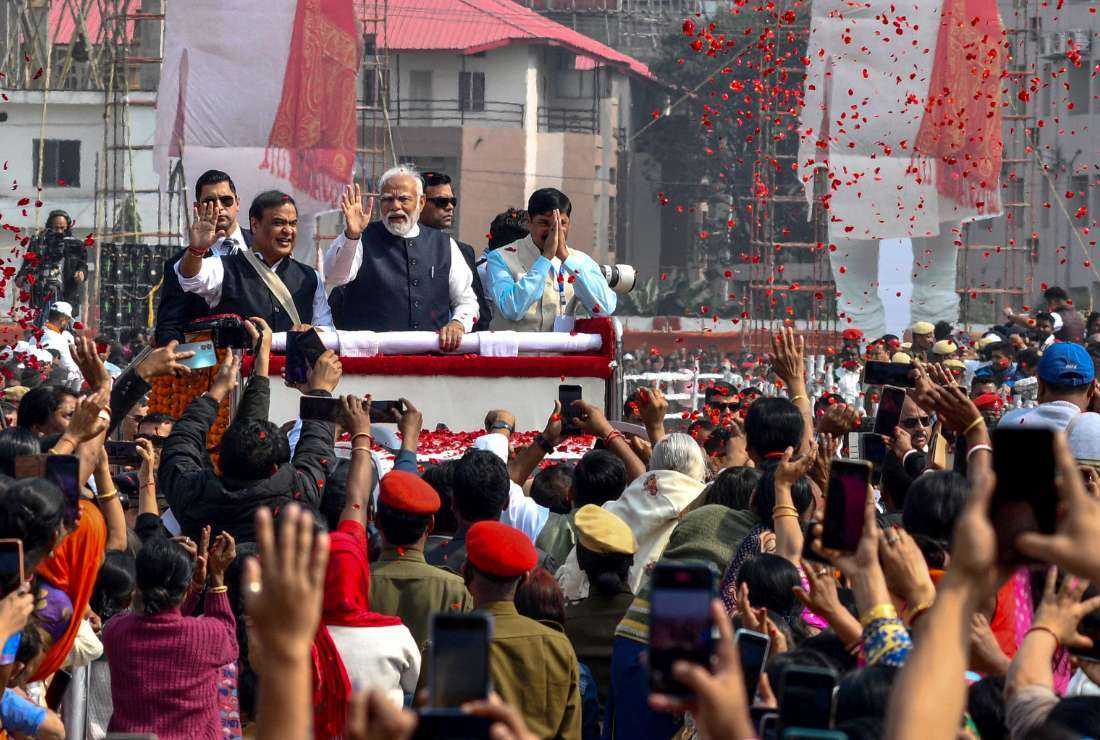
India's Prime Minister Narendra Modi (center) waves to supporters during a public rally in Guwahati on Feb. 4. (Photo: AFP)
When the last session of the current Indian parliament concluded on Feb. 10, Prime Minister Narendra Modi’s Bharatiya Janata Party (BJP) made a pitch for a successive third mandate in the upcoming national election.
The consecration of the Ram temple in Ayodhya town on Jan. 22 by Modi was taken up for a “general discussion” in the Lok Sabha, the all-powerful lower house of parliament, and a resolution was adopted, calling it “a historic day for the years to come... that fulfilled the hopes and aspirations of all Ram devotees.”
Rarely would such a topic of a religious nature have come up in parliament in the erstwhile secular India. But then this is the new India.
The Ram temple came up on the spot where once stood the Babari mosque built by a Mughal invader in 1528. It was demolished in 1992 by members of pro-Hindu organizations aligned with the BJP. Since then, the construction of the temple has been part of BJP’s election promises to its core Hindu voters.
Modi's trusted aide and Federal Home Minister Amit Shah said: "No one can read the history of this country by ignoring the Ram Mandir [temple] movement.”
The temple is a major booster for BJP ahead of national elections due in April-May this year. Modi is eying a record of sorts as no one other than India's first Prime Minister Jawahar Lal Nehru has won a third consecutive term.Poll pundits predict a comfortable victory for Modi and his BJP with its effective synthesis of Hindu nationalism and development agenda.
But Modi seems keen on a big win.
"Modi wants to make the 2024 elections his greatest victory ever," wrote senior journalist R Jagannathan in The Times of India. "He wants to humble others. Modi wants to wrest whatever political space is left for India's grand old Congress party.”Rahul Gandhi, the great-grandson of Nehru, is the de facto leader of the Congress party now.
Modi said his party aims to win 370 of the 543 seats in parliament and along with its alliance partners the BJP will easily cross 400 seats.
As if the Ram temple was not good enough to sway Hindu voters, the BJP government in northern Uttarakhand state, which is crossed by the Himalayas and is known for its Hindu pilgrimage sites, has adopted the Uniform Civil Code, a contentious and polarizing legislation.India does not have uniform laws for personal matters such as marriage, divorce, adoption, and inheritance. Instead, it has a patchwork of different codes based on the customary traditions of different communities and religions.
The BJP and the Rashtriya Swayamsevak Sangh (RSS), an umbrella organization of Hindu groups, have been campaigning against such codes, particularly those allowing polygamy and consanguine marriages, prevalent among some Muslims and even Hindus.
The new common law in Uttarakhand criminalizes Islamic divorce practices and iddat or the period a woman must observe after the death of her husband or after a divorce, during which she may not marry another man. The Uniform Civil Code will govern marriage, divorce, and inheritance for all, without any gender discrimination. Besides, it also prohibits marriage before the legal age.Asaduddin Owaisi, a Muslim lawmaker and president of All India Majlis-e-Ittehadul Muslimeen, a political party dedicated to protecting the rights of Indian Muslims, said such laws are against the Muslims' “right to practice religion and culture.”
“This Bill forces me to follow a different religion and culture. In our religion, inheritance and marriage are part of religious practice,” he said.
Such opposition, the BJP knows well, helps them galvanize Hindus against Muslims, resulting in the party getting more support from its core vote base.
On Feb. 9, Modi sprang another surprise by announcing three new names as recipients of India's highest civilian award – Late Prime Ministers P.V. Narasimha Rao and Chaudhary Charan Singh and M. S. Swaminathan, the agricultural scientist known as the father of India’s Green Revolution.
Rao was a Congress leader during whose tenure as prime minister the Babari mosque was torn down. His detractors within the party still believe Rao’s inaction led to the demolition.
But it was Rao who changed the face of the Indian economy by steering a series of pro-globalization reforms to rescue the almost bankrupt nation from economic collapse in the early nineties.
Rao was loyal to the Congress but had a serious leadership tussle with the Italian-born Sonia Gandhi, who is still at the helm of the party.
“And this is what suits Modi and his politics of 2024," says Assam-based analyst Ashutosh Talukdar.
Moreover, Rao was the first politician from southern India to become prime minister. He came from the Telugu-speaking area of Telangana and Andhra Pradesh, two states that together send 42 members to India's parliament.
The BJP could win only four seats in Telangana in the 2019 national elections and drew a blank in Andhra Pradesh. It is hoping to win over Telugu-speaking people by honoring Rao.
Similarly, the Late PM Singh was an influential leader of agrarian communities in Uttar Pradesh, Haryana, and Rajasthan in northern India. Honoring him may help Modi placate sections of angry farmers, who say his policies support corporates and suffocates them.
The political trends indicate smooth sailing for Modi and his party. But the prime minister is not taking any chances.
His opponents may think Modi is a lucky man. But Modi believes in creating his luck by exploiting every situation to his advantage.
*The views expressed in this article are those of the author and do not necessarily reflect the official editorial position of UCA News.


